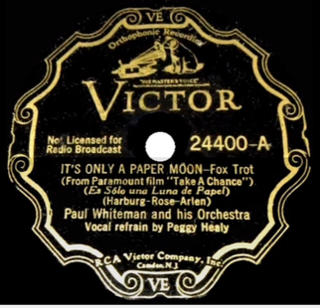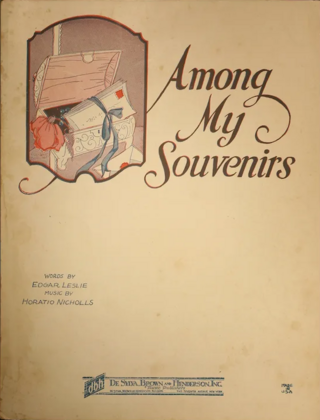Related Research Articles

An Indian summer is a period of unseasonably warm, dry weather that sometimes occurs in autumn in temperate regions of the northern hemisphere. Several sources describe a true Indian summer as not occurring until after the first frost, or more specifically the first "killing frost".
"Blues in the Night" is a popular blues song which has become a pop standard and is generally considered to be part of the Great American Songbook. The music was written by Harold Arlen, the lyrics by Johnny Mercer, for a 1941 film begun with the working title Hot Nocturne, but finally released as Blues in the Night. The song is sung in the film by William Gillespie.
"Lullaby of Broadway" is a popular song with music written by Harry Warren and lyrics by Al Dubin, published in 1935. The lyrics salute the nightlife of Broadway and its denizens, who "don't sleep tight until the dawn."
"Red Sails in the Sunset" is a popular song. Published in 1935, its music was written by Hugh Williams with lyrics by prolific songwriter Jimmy Kennedy. The song was inspired by the "red sails" of Kitty of Coleraine, a yacht Kennedy often saw off the northern coast of Northern Ireland and by his adopted town Portstewart, a seaside resort in County Londonderry.
"Prisoner of Love" is a 1931 popular song, with music by Russ Columbo and Clarence Gaskill and lyrics by Leo Robin.
"Too Marvelous for Words" is a popular song written in 1937. Johnny Mercer wrote the lyrics for music composed by Richard Whiting. It was introduced by Wini Shaw and Ross Alexander in the 1937 Warner Brothers film Ready, Willing, and Able, as well as used for a production number in a musical revue on Broadway. The song has become a pop and jazz standard and has been recorded by many artists.

"It's Only a Paper Moon" is a popular song published in 1933 with music by Harold Arlen and lyrics by Yip Harburg and Billy Rose.

"My Buddy" is a popular song with music written by Walter Donaldson, and lyrics by Gus Kahn. The song was published in 1922 and early popular versions were by Henry Burr (1922), Ernest Hare (1923) and Ben Bernie.
"Pennies from Heaven" is a 1936 American popular song with music by Arthur Johnston and lyrics by Johnny Burke. It was introduced by Bing Crosby with Georgie Stoll and his Orchestra in the 1936 film of the same name.
"The One I Love (Belongs to Somebody Else)" is a popular song composed by Isham Jones with lyrics by Gus Kahn. The song was recorded by Isham Jones' Orchestra on December 21, 1923, at Brunswick Studios in New York City, and published on January 7, 1924. On January 17 in Chicago, Jones recorded another version, with Al Jolson on lead vocals. Both versions made the charts that Spring, with Jolson's peaking at number 2, and Jones' at number 5. Sophie Tucker recorded her version February 1924, released on Okeh 40054.
"Don't Get Around Much Anymore" is a jazz standard written by composer Duke Ellington. The song was originally entitled "Never No Lament" and was first recorded by Duke Ellington and his orchestra on May 4, 1940. "Don't Get Around Much Anymore" quickly became a hit after Bob Russell wrote its lyrics in 1942.
"Moonlight Becomes You" is a popular song composed by Jimmy Van Heusen with lyrics by Johnny Burke. The song was written for the Paramount Pictures release Road to Morocco (1942) and published in 1942 in connection with the film. Vic Schoen wrote the arrangement.
The Anniversary Waltz is a popular song written by Dave Franklin, the lyrics by Al Dubin.
"I Wished on the Moon" is a song composed by Ralph Rainger, with lyrics by Dorothy Parker. Bing Crosby sang the song in The Big Broadcast of 1936.
"What's New?" is a 1939 popular song composed by Bob Haggart, with lyrics by Johnny Burke. It was originally an instrumental tune titled "I'm Free" by Haggart in 1938, when Haggart was a member of Bob Crosby and His Orchestra. The tune was written with a trumpet solo, meant to showcase the talents of band-mate Billy Butterfield. Crosby's orchestra recorded "I'm Free" the same day it was written.
Liza (All the Clouds'll Roll Away)" is a song composed by George Gershwin with lyrics by Ira Gershwin and Gus Kahn. It was introduced in 1929 by Ruby Keeler (as Dixie Dugan) in Florenz Ziegfeld's musical Show Girl. The stage performances were accompanied by the Duke Ellington Orchestra. On the show's opening night in Boston on June 25, 1929, Keeler's husband and popular singer Al Jolson suddenly stood up from his seat in the third row and sang a chorus of the song, much to the surprise of the audience and Gershwin himself. Jolson recorded the song a few days later on July 6, 1929, and his rendition rose to number nine on the charts of the day.

"Among My Souvenirs" is a 1927 song with words by Edgar Leslie and music by Horatio Nicholls.
"Ciribiribin" is a merry Piedmontese ballad, originally in three-quarter time, composed by Alberto Pestalozza in 1898 with lyrics by Carlo Tiochet. It quickly became popular and has been recorded by many artists. Decades later it enjoyed continued popularity with swing and jazz bands, played in four-four time.
This is a list of Bing Crosby songs he recorded twice or more during his career, excluding all of the 1954 re-recordings for Bing: A Musical Autobiography.
"The Lamplighter's Serenade" is a song written by Hoagy Carmichael (music) and Paul Francis Webster (lyrics). The construction of the song was unusual and did not conform to the normal AABA pattern. Instead, Carmichael used an ABA format that proved most effective.
References
- 1 2 Burlingame, Sandra, Indian Summer (1919) , retrieved 2009-02-13
- ↑ "Pop Chronicles 1940s Program #2". 1972.
- ↑ Whitburn, Joel (1986). Joel Whitburn's Pop Memories 1890-1954 . Wisconsin, USA: Record Research Inc. p. 310. ISBN 978-0-89820-083-6.
- ↑ Wilder, Alec (1990) American Popular Song: The Great Innovators, 1900-1950, Oxford University Press.
- ↑ "A Bing Crosby Discography". BING magazine. International Club Crosby. Retrieved July 29, 2017.
- ↑ https://www.discogs.com/master/1491245-Tony-Martin-Careless-Indian-Summer [ bare URL ]
- ↑ The Sideman Years (feat. Dick Garcia, 2011)
- ↑ https://www.discogs.com/release/11205631-Mrs-Mills-Candy-Floss-Indian-Summer [ bare URL ]